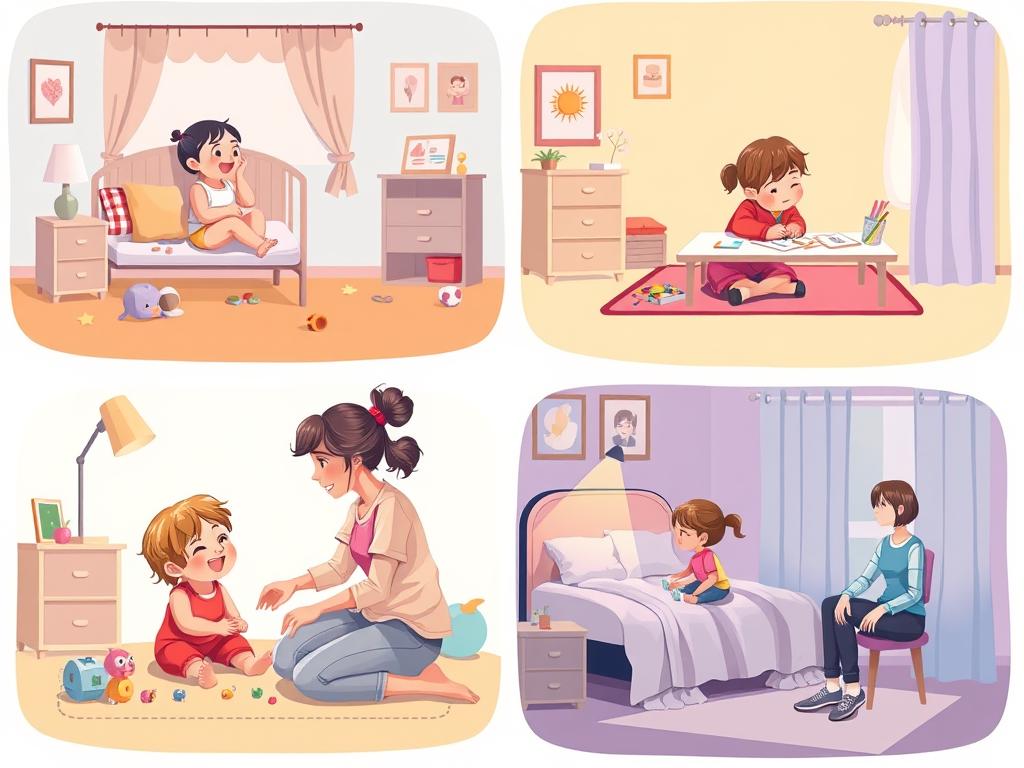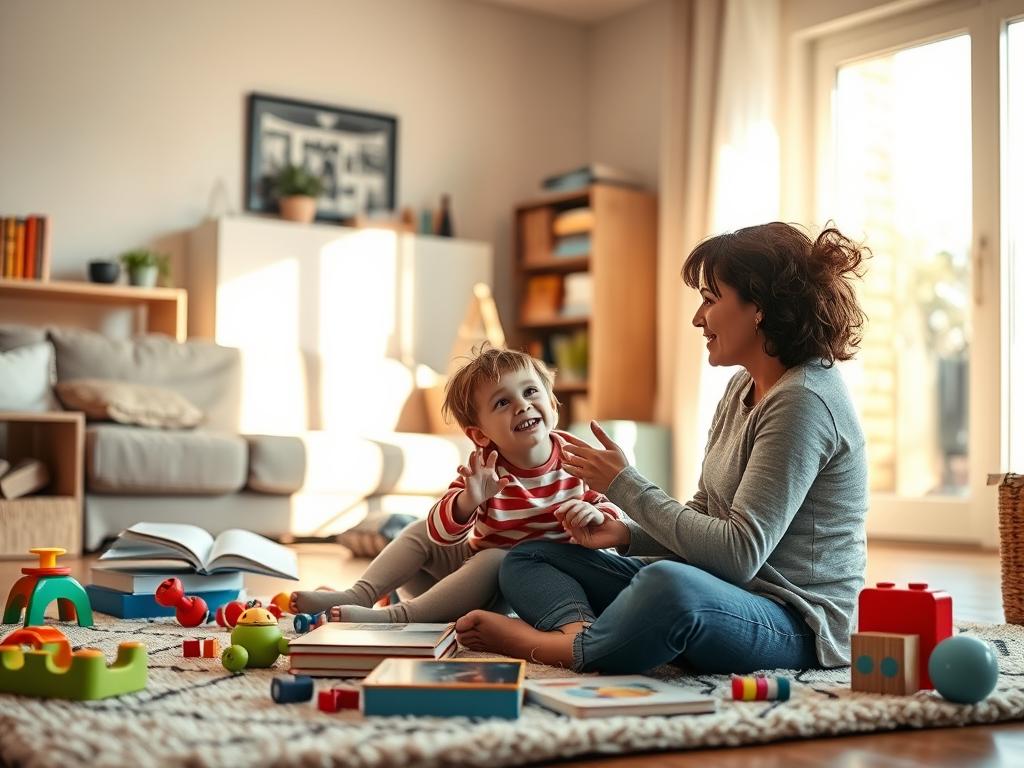Imagine a hectic weekday morning: the clock is ticking, and your child is struggling to articulate a thought amidst the whirlwind of breakfast and hurried preparation for school. You catch snippets of their fragmented sentences, their frustration bubbling just beneath the surface. Instead of rushing to complete your endless to-do list, you pause, kneel down to their level, and give them your full attention.
In that moment of active listening, you not only hear their words but also validate their feelings, fostering a sense of connection and understanding. This simple act can transform the parent-child dynamic and lays the foundation for supportive parenting.
In our fast-paced world, the importance of listening to children often gets overshadowed by the pressures of daily life. Yet, acknowledging their emotions and guiding them through their experiences can improve their problem-solving skills and increase their confidence. By embracing supportive parenting techniques, such as offering clear instructions and encouraging open dialogue, we create a nurturing environment where our children feel valued.
As we explore the depths of listening in parenting, we’ll uncover effective strategies that not only enhance communication but also strengthen our connections with our children. To dive deeper into the nuances of being an effective listener, check out this resource: 20 Effective Ways to Get Kids to.
Key Takeaways
- Active listening fosters deeper connections between parents and children.
- Children often feel understood when their emotions are acknowledged.
- Parents should focus on improving communication techniques to enhance relationships.
- Listening to children reduces their escalated behaviors and frustrations.
- Creating a supportive environment encourages children to share their thoughts and feelings.
- Reflecting on children’s feelings can validate their experiences.
Understanding the Role of Listening in Parenting
Listening is a fundamental aspect of effective parenting that significantly impacts a child’s development. Active listening nurtures parent-child communication by allowing children to feel heard and valued. This connection is vital for addressing children’s emotional needs, fostering a sense of self-worth, and enabling autonomy. Research shows that parents who employ active listening techniques enhance trust and improve communication with their children, leading to healthier relationships.
Why Listening Matters for Child Development
In the realm of child development, active listening proves to be critical. A study highlighted how parents who actively listen are better positioned to understand their children’s feelings, resulting in reduced behavioral issues. Adolescents consistently express a desire for their parents to listen, indicating the importance of this skill. When children acknowledge that their parent values their perspective, they are likely to develop strong problem-solving skills and better communication abilities.
Building Trust Through Active Listening
One of the key benefits of active listening lies in its ability to build trust with kids. Engaging in participatory listening creates a supportive environment where children feel empowered to share their thoughts without fear of judgment. This approach not only alleviates conflicts but also fosters deeper emotional connections. Children who believe their parents accept their feelings are more inclined to seek guidance during challenging times, reinforcing the significant role of effective parent-child communication. Implementing these strategies can enrich your relationship and help meet your child’s emotional needs. For more insights on the importance of listening, check out this valuable resource.
Techniques for Effective Listening
Practicing effective listening techniques significantly enhances parent-child communication. By incorporating both verbal and nonverbal strategies, parents can create an environment where children feel valued and understood. Engaging properly in conversations involves more than just words; it requires attentiveness to the child’s feelings and thoughts, which can effectively foster open dialogue.
Nonverbal Communication Techniques
Nonverbal communication plays a vital role in how children perceive their parents’ engagement. Techniques such as:
- Making eye contact to show attentiveness
- Maintaining an open body posture to express readiness to listen
- Mirroring emotions to validate children’s feelings
These practices demonstrate genuine interest and help strengthen connections. Parents can also use phrases like “I see” or “That sounds difficult” to acknowledge a child’s expression, further enhancing nonverbal communication. Such actions make children feel respected and heard, creating a safe space for parent-child communication.
Questions to Encourage Open Dialogue
Encouraging children to share their thoughts and feelings often revolves around the types of questions parents ask. Open-ended questions like “How did that make you feel?” invite children to elaborate, enabling richer conversations. Clarifying questions can ensure mutual understanding and underscore the importance of their opinions.
- Encourage elaboration by asking children to tell more about their experiences.
- Practice summarization to reflect back what was said, showing that the parent is truly listening.
- Allow pauses in conversation, embracing silence as a sign of thoughtful engagement.
By actively listening, parents can mitigate potential misunderstandings and conflicts, making children feel their perspectives are acknowledged, even if the parent does not necessarily agree. These effective listening techniques can foster trust and communication, resulting in healthier relationships over time.

The Impact of Listening on Emotional Well-Being
Listening actively to children plays a significant role in enhancing their emotional well-being. This practice provides an atmosphere where children can openly express their thoughts and feelings, crucial for navigating their inner emotional landscape. Through such interactions, parents cultivate an environment conducive to reducing anxiety and building trust.
Reducing Anxiety and Fear in Children
Research indicates that children who feel heard are less likely to experience high levels of anxiety. By utilizing active listening techniques, parents can create a safe space for children to articulate their feelings. This validation helps children process emotions and alleviates their fears, allowing them to approach various situations with greater confidence. When parents focus on understanding rather than immediately providing solutions, it enables children to develop their problem-solving skills, further contributing to their emotional well-being.
Fostering a Sense of Belonging
Children derive immense benefit from feeling included and valued within their family unit. Active listening cultivates a sense of fostering belonging, reinforcing that their thoughts and feelings hold significance. By making the time to listen attentively, parents not only strengthen the parent-child relationship but also enhance communication patterns as children grow. Responsive listening promotes an open dialogue, where children feel secure in expressing themselves, thus leading to deeper connections within the family.
Engaging in these effective listening practices is essential, particularly in light of rising mental health concerns among youth. Studies reveal that many children experience feelings of sadness or hopelessness, underscoring the need for reinforcing open communication at home. By adopting active listening as a core parenting strategy, guardians can significantly enhance their children’s lives. More detailed strategies for building stronger family bonds can be found in the following article here.
Recognizing Barriers to Listening
Effective listening is critical in parenting, yet various barriers to listening can hinder this process. By identifying these obstacles, parents can create a better environment for communication with their children. Two significant barriers often encountered are parent distractions and emotional responses in parenting.
Common Distractions for Parents
Parents often juggle numerous responsibilities that can lead to distractions while trying to engage in conversations with their children. Busy schedules and the prevalence of technology serve as notable examples of parent distractions. Notifications from smartphones and the demands of work schedules frequently pull attention away from meaningful interactions. It’s vital for parents to recognize these distractions and prioritize intentional listening to foster a supportive environment.
Emotional Responses that Obstruct Listening
Emotional responses in parenting play a significant role in how well parents communicate. When faced with stress or frustration, parents may react defensively rather than listening compassionately. Such emotional responses can create barriers to listening and hinder open dialogue. Acknowledging and managing these reactions can enhance understanding and strengthen connections with children. Resources that provide practical tips for reducing barriers to listening can be beneficial, as noted in this guide.

Creating a Supportive Environment
Establishing a nurturing atmosphere for children is essential in fostering their emotional and mental well-being. This involves dedicated time for parents to engage in one-on-one conversations, which strengthens the bond and allows for deeper understanding. Such interactions not only encourage supportive parenting but also help children feel valued and secure.
Setting Aside Time for One-on-One Conversations
One-on-one parent time creates the ideal setting for children to express their thoughts and feelings openly. By prioritizing these moments, parents can be fully present, tuning into their child’s experiences and emotions. Spending quality time together facilitates better communication and helps in understanding each other more profoundly. Simple activities during these moments can include:
- Going for a walk
- Having a picnic
- Reading a book together
- Cooking a meal
These interactions enrich the parent-child relationship, allowing for mutual trust and respect to flourish while also encouraging expression in kids.
Encouraging Expression Through Play
Play offers a unique avenue for children to articulate their feelings and thoughts without the constraints of adult conversation. Encouraging expression in kids through various playful activities, such as art, role-playing, and storytelling, helps unlock their emotions and experiences. These creative outlets foster communication, making it easier for parents to understand their child’s perspective. Engaging in play can:
- Enhance emotional regulation
- Encourage creativity and imagination
- Boost confidence in self-expression
- Facilitate open and honest discussions
By creating an environment that supports imaginative play, parents not only strengthen their relationship with their children but also contribute to their overall emotional development.
Listening at Different Developmental Stages
As children progress through various developmental stages, their communication needs evolve significantly. Tailoring your listening approach is vital for effective engagement with your child. Understanding the differences in communication at each age level ensures that parents employ age-appropriate listening strategies, enhancing interactions and fostering stronger relationships.
Tailoring Your Approach to Age and Maturity
Younger children typically express themselves through simple language and nonverbal cues. At this stage, parents should focus on:
- Active engagement through play and interactive communication.
- Minimal distractions during conversations to ensure full attention.
- Patience and encouragement when guiding children to share their thoughts.
As children mature, transitioning into their teenage years often requires parents to shift their listening strategy. Teenagers may seek more independence and the ability to express complex feelings. Engaging in open dialogue without interrupting allows them the space needed for self-expression while still providing necessary support.
Encouraging Independence and Decision-Making
Listening not only involves understanding what your child says, it also encompasses empowering them to make choices. Encouraging independence in kids promotes the development of problem-solving skills and enhances self-esteem. When parents facilitate age-appropriate listening, their children learn to:
- Identify solutions to their problems independently.
- Participate in decision-making processes.
- Feel heard and valued, which significantly contributes to their emotional intelligence.

Real-Life Benefits of Listening to Children
Engaging in active listening with children reaps numerous real-life benefits that extend well beyond simple communication. It bolsters their problem-solving skills in kids by empowering them to articulate their thoughts and feelings. This experience fosters critical thinking as children learn to explore solutions rather than relying solely on adult guidance. The results not only enhance their self-confidence but also contribute to their overall personal development.
Enhanced Problem-Solving Skills
When children feel heard, they develop strong problem-solving skills. Active listening creates an environment where they can express their feelings, explore various viewpoints, and brainstorm potential solutions. Observations indicate that children who experience consistent, empathic listening showcase improved self-esteem and resilience. These attributes equip them to tackle challenges effectively, facilitating a smooth transition into adulthood.
Improved Parent-Child Relationships
The benefits of listening extend to nurturing strong parent-child relationships. Children who receive attentive listening from their parents witness a significant boost in open communication. This connection fosters trust and respect, encouraging children to share their thoughts and emotions without fear of judgment. As a result, families cultivate a positive dynamic, promoting healthier interactions and stronger bonds.
- Facilitates understanding of children’s perspectives
- Strengthens emotional connections through trust
- Encourages children to express themselves freely
Listening to children enhances their ability to express their needs and empowers parents to understand their priorities. This harmonious exchange results in fostering mutual respect, positively impacting emotional well-being and family dynamics. The cumulative effect transforms the parent-child relationship, paving the way for lifelong connections built on understanding and support.
Taking Action: Practicing Active Listening
Practicing active listening is an essential commitment that can transform everyday parent-child conversations into meaningful exchanges. To effectively implement active listening strategies, parents can begin by eliminating distractions, such as putting down devices and giving their uninterrupted attention. Reflecting on what children say and maintaining a non-judgmental stance promotes a deeper connection while encouraging them to express themselves freely. Additionally, incorporating I-Statements during discussions helps articulate feelings without placing blame, thereby fostering a more supportive environment.
Strategies for Everyday Conversations
Implementing practical techniques can enhance the quality of communication. For example, making eye contact and allowing pauses for thought can create a comfortable space for children to share their perspectives. Summarizing what was heard not only reinforces the conversation but also shows children that their thoughts are valued. These active listening strategies can lead to smoother interactions, especially when addressing shared responsibilities like homework or chores, ultimately cultivating an atmosphere of teamwork and understanding.
The Long-Term Benefits of Consistent Listening
The long-term benefits of consistent listening extend well beyond just improved communication; they lay a foundation for strong relationships throughout childhood and into adulthood. As children feel validated, their confidence and self-esteem can flourish, leading to more resilient personalities. Over time, parents may find that their humble approach, acknowledging that they do not have all the solutions, strengthens the bond with their children even further. For more insights on modern parenting strategies, check out this helpful resource on active listening and parenting.











